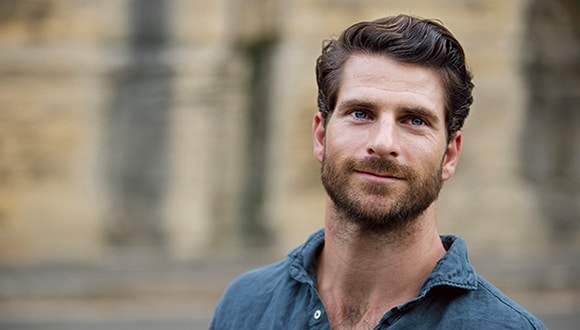Spotting suicide risk
The number of Australians taking their lives is concerning. Here’s how to recognise the signs in others and get help for yourself, if needed.
Health Agenda magazine
April 2018
A few years ago Dan Price, 33, found himself depressed and ready to take his life. He’s now an ambassador for suicide-prevention charity LIVIN. Here, he shares his story.
“In my late 20s it may have seemed to the outside world as if I had it all – a wonderful family, friends, wife, a house, cars and a successful career – but then things began unravelling.
“I was suffering from anxiety and depression, but at the time I had no idea. Sometimes I couldn’t even get out of bed. When my marriage broke down, I moved back to my parents’ home, but I felt a sense of failure, having lived in my own place since my early 20s. My depression and anxiety got worse and then I hit rock bottom.”
After a suicide attempt, Price was taken to hospital where he spent a couple of days on a psychiatric ward. “On my doctor’s advice, I spent the next 3 weeks working on my recovery in a private rehabilitation centre.
“I went back to work, but fears around my workplace not understanding and losing my job kept me quiet. I needed to feel happy to talk about what had happened, and not being able to was making my recovery harder, so I resigned. I decided to take a 6-month sabbatical, which I spent reading about and researching the brain and how to heal.
“Over the past 3 years there have been many ups and downs. I’m still on medication and regularly see a psychologist and psychiatrist. I write a lot and talk to people about how I’m feeling, rather than keeping it inside and being worried about what people might think.
“I’ve become mates with Arun Trevitt, the policeman who helped me [at the scene of his suicide attempt] back in 2014, and I’ve recently been able to be there for him as a friend to help him process the trauma he suffered after attending a horrific car crash in Sydney’s CBD.
“I’m passionate about trying to work with remote communities in Australia where there are not as many support services. My hope is that my story will help people to develop a better understanding of mental health issues, as well as help anyone who is struggling with their own battle.”

Every life matters
Around 8 lives a day are lost to suicide in Australia, the Australian Bureau of Statistics (ABS) reports. The number of suicide deaths has reduced slightly from a 10-year peak in 2015, but there’s more work to be done, says beyondblue CEO Georgie Harman. “Every life matters. This is not about statistics,” she says.
Lifeline Research Foundation executive director Alan Woodward agrees, saying the charity is urging the community to focus not just on the tragic numbers, but on the paths to recovery for about 100,000 Australians who experience suicidal thoughts each year.
“The ABS data represents the immense and overpowering challenges that many Australians experience, from loneliness and relationship breakdown to economic hardship and mental illness,” he says.
How to spot the signs
A person considering suicide usually gives some clues to those around them, though these may be subtle, reports beyondblue. If you’re worried about someone in your life, it’s important to take these warning signs seriously.
Someone experiencing suicidal thoughts may be feeling deeply unhappy and may also be feeling hopeless, helpless, lonely or disconnected.
We list some of the common signs of suicidal thoughts.
Behaviours including:
- alcohol or drug misuse
- withdrawal from family and friends
- quitting activities that were previously important
- putting affairs in order.
Conversational signs such as:
- Helplessness: “Nothing I do makes a bit of difference; it’s beyond my control and no one can help me.”
- Talking about suicide or death.
- Feeling trapped: “I can’t see a way out of this mess.”
- Feeling like a burden: “They’d be better off without me.”
- Lack of belonging: “I just don’t fit in anywhere.”
- Hopeless: “What is the point? Things are never going to get any better.”
Physical changes
- major changes to sleeping patterns
- loss of energy
- loss of interest in personal hygiene or appearance
- weight gain or loss.
What you can do
If you’re worried that someone may be suicidal, Lifeline suggests a 3-step prevention approach.
1. Ask directly: “Are you thinking about suicide?” This shows you care and encourages them to get help.
2. Stay and listen. Listen closely and let them express their feelings. Stay with them or find someone else reliable to stay with them.
3. Get help. See below for advice or call 000 if life is in danger. Get support yourself, too.
related articles
MENTAL HEALTH: A HELPING HAND
How to help a family member or friend through a mental health episode.
MALE DEPRESSION: STARTING THE CONVERSATION
Although depression in men is common, many find the condition difficult to speak about. We talk to 2 men who reached out, got help and are on the road to recovery.
HOW TO MANAGE STRESS
Reclaim calm with these expert-approved approaches to dealing with stress and anxiety.
ARE THERE DOWNSIDES TO ALWAYS TRYING TO BE POSITIVE?
Looking on the bright side of life might not be helpful in difficult times, with studies showing suppressing emotions can negatively affect our health.